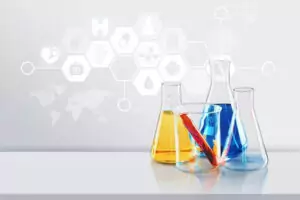Analytical chemistry is a fundamental discipline within the field of chemistry that plays a crucial role in various industries and scientific research. By employing a range of techniques, analytical chemists obtain and analyze qualitative and quantitative data of substances, enabling them to uncover the composition and structure of compounds at atomic and molecular levels. In this article, we will delve into the applications of analytical chemistry, explore the techniques used, and discuss the significance of studying analytical chemistry in various career paths.

✅ AI Essay Writer ✅ AI Detector ✅ Plagchecker ✅ Paraphraser
✅ Summarizer ✅ Citation Generator
Applications of Analytical Chemistry
Analytical chemistry finds extensive applications in diverse fields, contributing to advancements in medicine, environmental science, industrial manufacturing, materials science, and forensics. Let’s explore some of these areas in detail:
Medicine
Diagnostic tests rely on analytical chemistry techniques to determine blood types, identify genetic signatures, and detect viruses using polymerase chain reaction tests. The precise analysis provided by analytical chemistry aids in accurate medical diagnoses and treatment plans.
Environmental Science
Analytical chemistry plays a vital role in monitoring and analyzing pollutant levels in the environment. It enables the detection of previously unknown pollutants and helps in identifying their sources, facilitating effective environmental management and protection.
Industrial Manufacturing
Quality assurance in industrial manufacturing heavily depends on analytical chemistry. By ensuring precise proportions and accurate measurements of ingredients, analytical chemistry helps maintain the quality and consistency of manufactured goods.
Materials Science
Analytical chemistry contributes to the development of innovative materials, such as superconductors, superinsulators, ultra-light solids, and nano-size machines. Through precise analysis, researchers gain valuable insights into the composition and properties of materials, driving advancements in materials science.
Forensics
Analytical chemistry plays a central role in forensic investigations. It aids in detecting traces of substances like blood at crime scenes and identifying unique genetic markers, assisting in solving crimes and providing crucial evidence.
Techniques Used in Analytical Chemistry
Analytical chemists employ various techniques to determine the composition, structure, and properties of substances. Here are some commonly used methods:
Chemical Tests
Chemical tests involve the use of specific reagents and enzymes to detect the presence or absence of certain substances. For example, acid tests can be employed to detect the presence of gold, while the Kastle-Meyer test helps identify the presence of blood.
- Flame Test: The flame test utilizes the characteristic colors emitted by substances when exposed to a flame to identify certain ions in aqueous solutions. However, this method has been largely replaced by more precise techniques such as spectroscopy.
- Spectroscopy: Spectroscopy involves the measurement and analysis of the interaction between matter and electromagnetic radiation. It allows chemists to identify elements and molecules based on their unique spectroscopic signatures, providing valuable information about the chemical composition of substances.
- Gravimetric Analysis: Gravimetric analysis is a quantitative technique used to determine the mass or concentration of an analyte. It involves weighing the analyte before and after a separation process, enabling the calculation of the desired measurement.
- Separation Techniques: Analytical chemists employ various separation techniques to isolate and analyze individual components within a mixture. Chromatography, electrophoresis, and field flow fractionation are examples of separation techniques used to achieve precise analyses.
- Volumetric Analysis: Volumetric analysis, also known as titration, involves measuring the volume of a solution required to react completely with a known amount of another substance. This technique allows for the determination of concentrations and stoichiometric ratios in chemical reactions.
Importance of Studying Analytical Chemistry
Studying analytical chemistry provides students with essential skills and knowledge that are invaluable in various scientific and technical careers. Here are some reasons why studying analytical chemistry is crucial:
- Refining Analytical Skills: Analytical chemistry hones students’ abilities to qualify and quantify data accurately. It equips them with the skills to tackle complex problems by breaking them down into simpler components, allowing for a systematic and organized approach to problem-solving.
- Foundational Skills for Science Students: Analytical chemistry is a core component of chemistry education. Science students, regardless of their specific field of study, benefit from a solid understanding of analytical chemistry. It provides a strong foundation for further studies in chemistry and related disciplines.
- Career Opportunities: Analytical chemistry opens up diverse career opportunities across industries such as pharmaceuticals, environmental monitoring, food safety, quality control, and research. The demand for analytical chemists continues to grow, offering stable and rewarding career paths.
- Interdisciplinary Applications: Analytical chemistry is not limited to chemistry alone. Its principles and techniques are applicable in interdisciplinary fields, including environmental science, forensic science, materials science, and more. Understanding analytical chemistry allows professionals to contribute to these interdisciplinary domains.
Conclusion
Analytical chemistry is a critical discipline with wide-ranging applications in medicine, environmental science, industrial manufacturing, materials science, and forensics. Through techniques such as chemical tests, spectroscopy, and gravimetric analysis, analytical chemists unravel the mysteries of substances, enabling advancements and breakthroughs in various industries. Studying analytical chemistry equips students with essential skills, fostering analytical thinking and preparing them for fulfilling careers in diverse scientific fields.
FAQ
How does analytical chemistry help in environmental science?
Analytical chemistry plays a crucial role in environmental science by enabling the monitoring and analysis of pollutant levels in the environment. It helps in detecting and quantifying pollutants, identifying their sources, and assessing the impact on ecosystems. This information is vital for effective environmental management and conservation efforts.
What role does analytical chemistry play in industrial manufacturing?
In industrial manufacturing, analytical chemistry ensures the quality assurance of products by providing precise measurements and analysis of ingredients and materials. It helps maintain consistent proportions and purity, ensuring that manufactured goods meet quality standards and regulatory requirements.
How is analytical chemistry used in materials science?
Analytical chemistry is instrumental in materials science as it aids in the development and analysis of new materials. By employing techniques such as spectroscopy and chromatography, analytical chemists can identify and characterize the composition, structure, and properties of materials, enabling advancements in fields like nanotechnology, superconductors, and ultra-light solids.
What is the significance of analytical chemistry in forensics?
Analytical chemistry plays a central role in forensics by providing valuable tools for evidence analysis and crime scene investigation. It helps in identifying and analyzing substances such as blood, drugs, and trace evidence. Analytical techniques like spectroscopy and chromatography assist in detecting and characterizing these substances, aiding in criminal investigations and the justice system.
What are some common analytical chemistry techniques?
Some common analytical chemistry techniques include chemical tests, spectroscopy, gravimetric analysis, separation techniques (such as chromatography), flame tests, and volumetric analysis (titration). These techniques allow for the qualitative and quantitative analysis of substances, enabling the identification of components and their concentrations.
Can I pursue a career in analytical chemistry?
Yes, pursuing a career in analytical chemistry is possible. Analytical chemists are in demand across various industries, including pharmaceuticals, environmental monitoring, forensic science, food and beverage, research, and more. A strong foundation in chemistry and analytical skills, along with relevant education and experience, can open up rewarding career opportunities in the field.
Is there a distance learning program for a Master’s in analytical chemistry?
Yes, there are distance learning programs available for a Master’s in analytical chemistry. These programs provide the flexibility to study and work simultaneously, offering online coursework and video-based lectures. Universities and educational institutions, such as the University of Manchester, offer such distance learning programs tailored for qualified professional chemists who wish to enhance their expertise in analytical chemistry.
Who are some reliable analytical chemistry suppliers?
Some reliable analytical chemistry suppliers include ReAgent Chemical Services Ltd., which has been established since 1977 and holds ISO accreditations. Other reputable suppliers can be found through industry directories, trade associations, and referrals from professionals in the field. It is important to choose suppliers that prioritize quality, safety, and adherence to regulatory standards.
Follow us on Reddit for more insights and updates.





Comments (0)
Welcome to A*Help comments!
We’re all about debate and discussion at A*Help.
We value the diverse opinions of users, so you may find points of view that you don’t agree with. And that’s cool. However, there are certain things we’re not OK with: attempts to manipulate our data in any way, for example, or the posting of discriminative, offensive, hateful, or disparaging material.